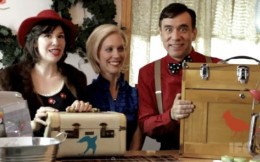The Fate Of The Knowledge Worker

As soft and cuddly as the workplace has become, or however easy it is to go to work without leaving your bedroom, these changes have occurred to improve profitability, not the life and sanity of the worker. And it’s working: even as employment remains stagnant, American productivity is growing by leaps and bounds. What we’ll have to see is whether this century will prove to be closer to the 19th century or the 20th. My bet, as I sew a bird on my canvas tote in order to carry my jars of local jam, is that the last we’ll see of the stability of white-collar work is the Eames chair, installed in home offices that double as living rooms.
Marthine Satris has a very on-point essay up on the Millions today, called “Collared or Untied: Reflections on Work in American Culture.” She talks about the creation of the white-collar “knowledge worker” and its place in everything from Portlandia to Dickens, then looks at two new books about work: Biz Stone’s memoir, the title of which I am too embarrassed to copy and paste, and Nikil Saval’s Cubed. Love you, Marthine.
…The knowledge worker is the combination of artist and worker. The software engineer makes his own apps on weekends and the graphic designer makes cute videos for fun, and that fact offers companies the perfect opportunity to cut costs. When people are looking for jobs that don’t feel like work, companies can hire a guy who will take their lower salary and no benefits over the security of one of the quickly evaporating salaried jobs where he’ll be a middle manager counting up widget sales and thingamabob costs. Richard Florida, in his foundational book, The Rise of the Creative Class, says that the defining element of the creative class is placing flexibility and feeling challenged above base pay. The perks of not wearing a tie and telecommuting can feel like prizes that make up for a lower pay grade, too.
Stone’s description of his approach to work reads like a list of supposed Millennial characteristics — he’s easily bored, he’s impatient, and he wants to do work that’s satisfying, self-fulfilling, individualist, and creative. But he’s 40. These characteristics aren’t just those of recent college graduates, despite the many articles citing the terrible work ethic of young people today. They are the characteristics of the knowledge worker, and while managers might not like it, corporations love it.
Support The Billfold
The Billfold continues to exist thanks to support from our readers. Help us continue to do our work by making a monthly pledge on Patreon or a one-time-only contribution through PayPal.
Comments